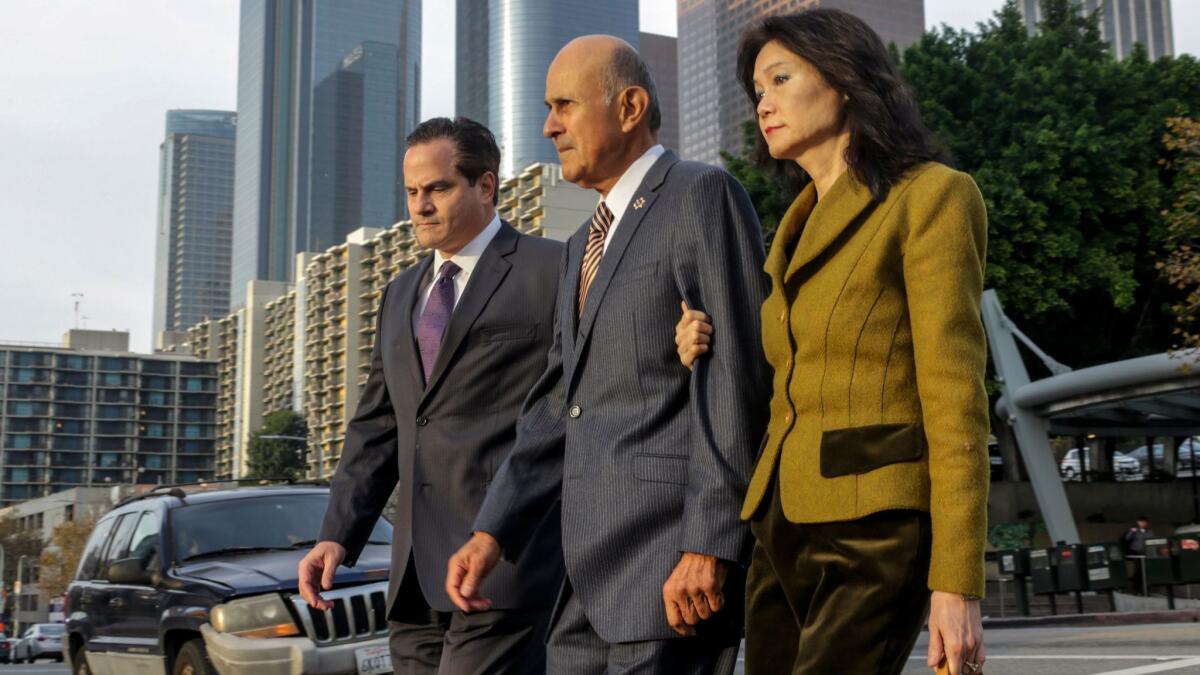Ex-L.A. Sheriff Lee Baca’s defense comes down to a question of character

- Share via
As testimony in his federal corruption case neared an end on Friday, former Los Angeles County Sheriff Lee Baca’s defense centered on something no prosecution witnesses, recordings or documents have addressed: his character.
One by one, retired local and federal officials told jurors that Baca wasn’t the type of man who would break the law.
The ex-sheriff was credited with trying to reduce force in jails. One former federal prosecutor recounted steps Baca took to improve oversight of discipline for deputy misconduct. And the father of a slain deputy recalled the help the empathetic lawman gave to console him.
The defense witnesses made hardly any mention of the six-week period in the summer of 2011, during which prosecutors allege Baca colluded with subordinates to foil a federal investigation into beatings and corruption by his deputies in the county’s jails.
Meanwhile on Friday, defense attorneys announced that Baca would not be taking the witness stand to defend himself against allegations that he conspired to thwart the civil rights inquiry by helping hide an inmate who was acting as an FBI informant, intimidate a case agent and tamper with witnesses.
Had the retired sheriff testified in his own defense, he would have opened himself up to aggressive cross-examination by prosecutors who could have used his public statements and witness testimony as proof of his complicity, said Miriam Krinsky, a former federal prosecutor who led a commission on jail violence and who has closely followed the trial.
“There’s powerful evidence he would be confronted with … that he knew what was going on, set things into motion and entrusted the wrong people,” she said. “I imagine it’s not easy for someone with the presence and personality that he’s brought to everything to sit silently and be a spectator.”
Baca, who ran the nation’s largest sheriff’s department for more than 15 years, is accused of conspiracy and obstruction of justice, charges that could send him to prison for years if he is convicted.
Former L.A. County district attorneys Ira Reiner and Steve Cooley each said in brief testimonies that Baca had a reputation for being law-abiding. Those opinions were echoed by Carl Covitz, a former deputy secretary of housing and urban development in the Reagan administration, and by Rose Ochi, who worked on drug policy in the Clinton White House.
“Very solid,” Ochi said when asked by Baca’s attorney about the sheriff’s reputation regarding the law. “He’s someone that I hold in high regard.”
Jurors also heard from a father who said he first met Baca after his son, a sheriff’s deputy, was killed in the line of duty in 2002. John March recalled how Baca consoled his grieving family and gave them his home and cellphone numbers, making himself available to them. March said he later worked with Baca when the sheriff asked him to help on his youth foundation.
“Lee doesn’t compromise,” March told the jury. “In 14 years, I’ve never seen him compromise in following the law.”
Krinsky said rather than take the government’s witnesses head-on and contradict the prosecution’s evidence, Baca’s defense was attempting to paint a different picture of the former sheriff as someone who would not have committed the alleged criminal acts.
“These witnesses were not put on to try to get at the conspiracy … but rather to create an alternative way to think about Lee Baca,” she said. “His witnesses were almost trying to create a pair of glasses for the jury to wear.”
Defense attorneys also called to the stand witnesses who discussed Baca’s attempts to address long-running complaints from inmates about excessive force and retaliation in his jails.
Michael Gennaco, a former civil rights prosecutor and longtime police use-of-force consultant, said it was at Baca’s initiative that the county created the Office of Independent Review, a civilian watchdog group that provided oversight of misconduct in the Sheriff’s Department. He said Baca was supportive of his work with the group.
Paul Pietrantoni, a retired Sheriff’s Department commander, told jurors that at Baca’s request, he taught “force reduction” classes to new deputies before they were assigned to the jails.
Baca’s defense called back Cecil Rhambo, who had previously testified in the government’s case. Rhambo, an assistant sheriff at the time of the alleged obstruction, testified Friday about the layers of command between Baca and his line deputies.
Under cross-examination by a prosecutor, he said he was kept in the dark about the decisions regarding the handling of the federal informant.
“You believed you were not informed because Mr. Baca took ownership of the issue, correct?” Assistant U.S. Atty. Brandon Fox asked.
“Yes,” Rhambo responded.
“It was Mr. Baca’s philosophy that the Sheriff’s Department should police itself, correct?” Fox asked.
“Yes,” the witness said.
Baca’s attorneys were expected to rest their case early Monday, after which jurors will hear closing arguments. The jury could begin deliberating as early as Monday afternoon.
For more news on the federal obstruction trial of former L.A. County Sheriff Lee Baca, follow @vicjkim on Twitter
ALSO
Stakes rise in jailhouse informant case as judge blasts O.C. sheriff
Man who was shot by LAPD during exchange of gunfire is charged with attempted murder
Robert Durst’s lawyers challenge evidence and accuse prosecutor of ‘deceptive’ jailhouse interview
More to Read
Sign up for Essential California
The most important California stories and recommendations in your inbox every morning.
You may occasionally receive promotional content from the Los Angeles Times.














